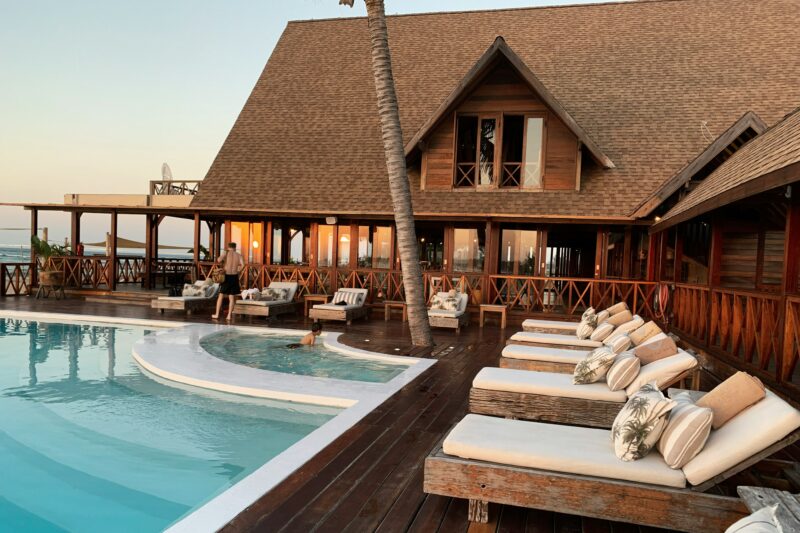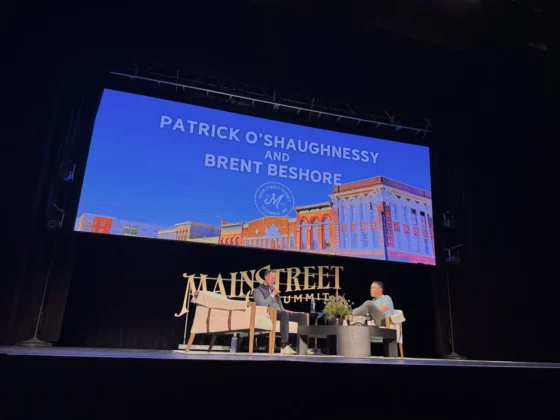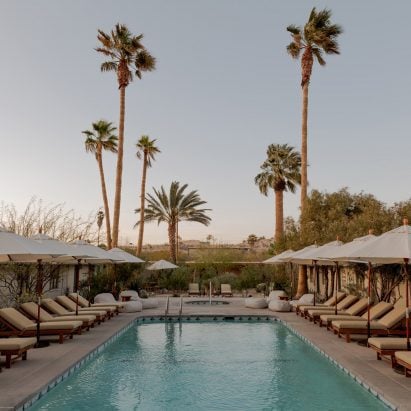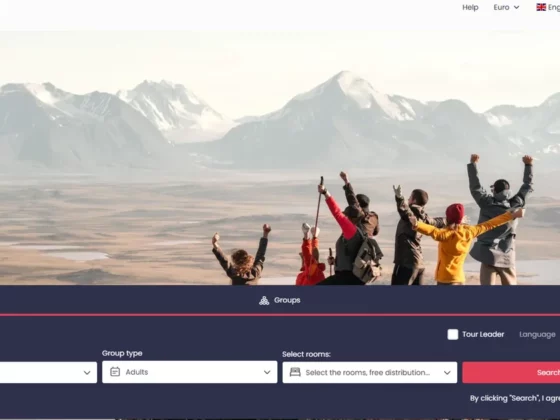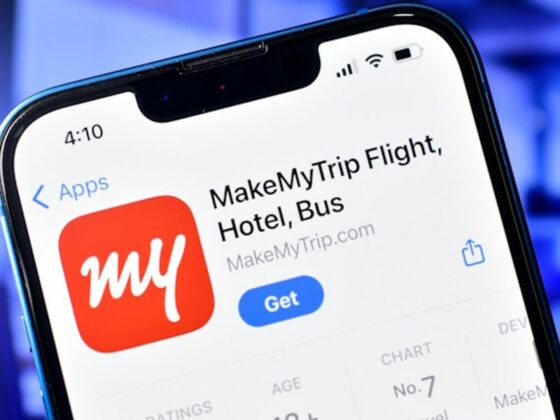Josiah Calvin Tilokee has fascinated me for years. He’s been named a top influencer in hospitality, the mastermind behind the Instagram comedy account @revparblems, followed by tens of thousands of people who enjoy the memes and hilarious videos he creates that often go viral. But that’s just one side of his life. He’s also an experienced revenue leader for hospitality companies in major markets like New York, and he recently co-founded a new strategic advisory firm, Lighthouse. In this episode, you’ll learn about the challenge he saw that led him to start this company and some eye-opening insights about what might be holding your company back from providing the innovative hospitality it could be.
Josiah I wonder if we could talk about why you launched Lighthouse. I’m curious what challenges in the market or opportunities you saw that made you say, I want to open my own business.
Calvin Yeah. Well, it all started with my business partner and I just having conversations. He’s someone I’ve known for a long time and we just hang out socially. He’s an investment banker, so his background is all in that space of raising capital for different projects. And he mentioned it to me like a year ago and just said, hey, you know, I have some people that are looking to get into hotels. Maybe you and I can partner on it. And at that point, I was busy launching the other part of my business, the social media agency. But once I got a little bit more on my feet, it was like, OK, hold on, maybe let’s see how we could incorporate it. And in my head, one of the issues, the main issues I have with the industry in general, is the lack of diversity in the sense of how that impacts everything else. I mean, you look at your daily life. I just came back from vacation. My client sent me a check. I’m not going to the bank. I take a picture of that check. It goes into my bank account. Done, right? That’s everyday technology that people use. Why do we have to go to a hotel? Give your ID, your credit card. Everybody has to do this in order to check-in. I checked into my flight on my phone. I don’t stop. I can’t tell you the last time I’ve gone to a desk to have to check anything in, right? We’re all used to doing that on a day-to-day basis. Hotels are notoriously behind the curve on tech and many other things, social media included, because I think that’s because of a lack of diversity at the top. And it’s not to denigrate or insult anyone. But when you only have the same kind of person making all the decisions, they’re going to look a certain way. You’re not going to be nimble. You’re not going to be thinking forward. The whole industry, in my opinion, needs a shakeup. We need more. We need younger people. We need more women. We need more minorities. We need that boardroom to look different to be able to impact things like that, things like, You know, why does a front desk person have to write a checklist every day? Still, it’s 2023. You’re manually checking it. This is stuff that was going on when I got in the industry in 2000. You know what I mean? These are not things that we need to evolve. And the reason we’re not evolving is because those rooms don’t look different enough. So, I know it was a long way to get to the answer, but to me, it had to start with what I was doing on social media because even now, I think hotels are behind the curve. They don’t understand how impactful that can be to your bottom line by doing things on social media. And the reason for that is that the people making these decisions are not on social media. They don’t have one, so they don’t really understand how that works. You need people in that boardroom who are making decisions that are nimble of mind. They don’t need to be a certain age, but somebody willing to say, hey, you know what? Yeah, this is different. I may not do it, but let me get somebody who knows about it. Right? We need to start thinking outside of the box. And again, so I feel for me to be more successful doing things like social media, tech, and all of these companies, let’s attack it from the other angle too. Right? Let’s get more people who understand, who are not in the same age bracket, in the same demographic, of the same gender. We need different people in there so that way we can impact the industry from the top and the bottom. Did that make sense?
Josiah If I think about your career and watching you and enjoying your work and appreciating your work, Calvin, over the years, at first glance, people may not understand how these elements connect. But I think what you just described is a really good summary of that. Yes, the comedy is now tens of thousands of people know you, but thousands of others know you for your work in revenue strategy, right? As a leader within these companies and now as an advisor. I think, you know, what you’re telling me about the lack of diversity is holding us back from creativity. It’s holding us back from innovation. It’s holding us back from revenue and business performance. You can say that because you’ve seen it. You’ve seen it. You’ve led revenue for these companies, your partner is an investment banker. You’re approaching this from a business bottom line perspective, or you’re factoring that in as this has real business outcomes. And I appreciate you saying that because I think every great business has started to solve a hard problem. And I think you just articulated what that hard problem is. So could you tell us a little bit about what you’re doing at Lighthouse and I guess how you’re helping the industry address this problem?
Calvin Yeah, absolutely. So again, my partner came to me, and he said he has people who are looking to invest in socially conscious projects. women minority-owned businesses, specifically hotels. He just happened to find people who weren’t necessarily a fit for where he was, whether that be the size of the project because a lot of times they’re too small. You know, your bigger banks are just not going to answer a question about a five, eight, $10 million hotel, right? You know, the analogy I use in the hotel space is, you know, whether that group, a lot of times the bigger group is just as much work if not less than your smaller group. Think about a group that books out your whole hotel. That salesperson may have a few conversations about it, and get the contract out. and we’re done. Now think about the nine-room wedding on the weekend. How many calls are you going to get about that one, right? So, for them, it’s not worth opening the doors and getting lawyers involved in all of this for a $5 million deal. It’s just not worth it for them. But we’ve been able to source people who will deal in that space. So if you’re starting out as a hotelier, you’re somebody who wants to own a hotel, you’re not going to buy the Waldorf, right? That’s not where it starts. It starts with a five, eight, $10 million smaller brand, maybe even an independent. We find people who will help make that happen. We have found a network of people who will deal in that space. They also are eager because we’ve all become, I think, more conscious as a society over the past five to seven years for a multitude of different reasons, but I think we’ve all become aware of the struggles of other people because of a lot of things that have happened that were unavoidable for us. I think it’s become like, why are those people being treated that way? Like, I can relate to that because I’m XYZ, you know, and my personal experience as a minority working in the industry and moving up the chain, the higher you go, the fewer people like me I saw, the fewer women I saw. I was fortunate enough to have a lot of female bosses. I had a lot of VPs that were female. And I’ve seen what they deal with. I’ve seen the discrimination, whether intentional or not. You know, things like, you know, my VP is walking into a room. She’s ready to present. And they’re like, oh, will you be taking notes? And I don’t even think it’s said with the intention of insulting. It’s just we’ve become so accustomed to seeing women in only one role that they must be here to provide a service to the rest of us. No, she’s running the meeting. You know what I mean? And in order for that to change, you just need to have more people doing it.
Josiah I wonder, Calvin, if we could talk a little bit about what it means to be an ally. Hertelier named you as an ally of the month, and I’ll link to that interview in the show notes of this episode and really encourage people to check that out. But for what you’ve seen in your work, what advice would you have for those listening to be acting in this way and supportive of the change they’ve described?
Calvin Yeah, I think we just, you know, any of my fellow New Yorkers would know that if you see something, say something. It’s just about helping everyone. I mean, isn’t that what hospitality is all about at the end of the day? Isn’t that ultimately what we’re all here for, right? I just look at it without getting too, too much into like a larger social conversation.
Josiah We can go there if you want. You know, this is an unfiltered conversation. So up to you, up to you. You can go as far as you want.
Calvin Got it. No filters here. Got it. I mean, well, again, as a black male in this country, I can say the Black Lives Matter movement didn’t gain the steam that it gained over the past couple of years without the help of people who weren’t black. Right? Because when it’s just the community that’s talking about the problem, eventually, it just sounds like complaining. Because nobody can relate to it. But if someone who’s not black starts talking about the issue, then you can relate to that person. Right? A white male talking to another white male about this issue, all of a sudden it sounds differently. People are more perceptive, or receptive, excuse me, to a message from people who look like them. That is as simple as why you have certain spokespeople for different things. There’s a reason they get those people because they’re trying to reach a certain market. Right. So it’s as simple as that. So if we’re constantly talking about our issue, and it’s just us, it’s not going to go anywhere. So in that sense, what I’ve noticed it, and it’s like, well, if women are constantly just talking about their issues in the workplace, it’s not going to go anywhere because it’s going to take someone to speak to that person in a way that they can relate to. Not that the message is not being said in the right way. I can say the exact same thing, but just hearing it from somebody who looks more like you all of a sudden is like, wait, yeah, I never thought about it that way, you know? So I hope I articulated that well, but I think we’ve all got to help each other. I’m a big proponent of that. Until we all have a seat at the table, nobody’s got a seat at the table, you know? And, like, I wouldn’t want to do what I’m doing and then, okay, well, now minorities, black people who look like me, are welcome, but women still aren’t. Or, you know, people of a certain gender aren’t. Or the LGBTQ community isn’t. Like, we’ve all got to help each other. That’s the only way it’s going to change. And all of these voices need to be heard. All of these voices need to be represented in those boardrooms so that way better decisions are made. I mean, I’ll tell a story that I recently, I think it really, because again, I have a very, I find the humor just about anything. But it helped really kind of outline what I’m trying to say here. So recently, one of these major league baseball teams they had a night where they were recognizing visually impaired people. So the team came out with the team names and the player’s names. written in Braille, and it’s like, who does that help? They can’t see it. I mean, it’s a nice gesture, but who does that help? It’s okay. At a minimum, it’s like the people who can’t see it will say, okay, well, now at least I’m aware that people who maybe can’t really see are into baseball, and they enjoy the sport like I do, but is that the best we could do, right? What makes that better is you have someone who’s visually impaired in part of the decision-making process. And they can say, well, this is a good start, but why don’t we have some of our most hardcore visually impaired fans bring them down to the field? The crowd can see them. Maybe they actually touch the uniform so people can see what life looks like for them. Then maybe they get to meet the team or something like that afterward. But you could, as a start, But it’s like, we can do so much more. And I think what happens now is people who are outside of the community make decisions based on what they think that community wants, as opposed to just getting them in the room and making sure they get what they want.
Josiah That’s a great example. I appreciate you sharing that because I think that could happen in sports, it can certainly happen in hospitality. And I think there’s this opportunity to bring people in that you claim to be helping. Let’s get people involved, right? I wonder if we could talk a little bit, Calvin, around, I’m curious, I’m excited by the change and the opportunity that you’ve described early in our conversation. I think with any sort of change, I always love to see where do you start to see the change happening, just to give people a little sense of what does this look like? And I’m curious if any people or projects or organizations come to mind where you start to see this in play? And I don’t know if this would be an individual investor or somebody wanting to get in. It could be anybody or anything, but I’m curious where you start to see this happening that you’re excited by.
Calvin Yeah, well, I can say just in, you know, attending conferences in many different capacities over the years, you start to see more, more diversity on the panels, more diversity of content, more diversity of topics. in these breakout sessions, people are talking about different things. When we went to Hunter this past March, there was a whole panel. The first panel of the entire conference was about women leadership, women hotel ownership and investment, right? You start to see that. I don’t know if you would have seen that three or four years ago, right? So you start to see more of these type of things. We work with Tracy Prigmore, who runs She Has a Deal, which is a Shark Tank-style competition for women hotel owners. And we working with her, we’re actually actively looking to help her with some investments. But I mean, a program like that is awesome. You know, I’m not even sure Tracy understands how big that is. You know, literally everyone that we speak to about what we do, they’re like, Hey, you got to talk to Tracy. Do you know Tracy? And it’s like, that’s huge, you know? And I mean, it all starts somewhere. And we’ve spoken to anybody from college kids with the dream to people who have worked in the industry. And now we’re looking to own as opposed to just being an employee. But you do start to see a lot more of these things everywhere, all these different conferences. Now there’s a lot more representation for these types of initiatives.
Josiah It’s exciting to see that. I’m going to ask you a bit of a big, broad question. It’s a little tough because there’s such a span of listeners. But my question for you is, if someone wants to move toward a path of eventually being a hotel owner, maybe let’s just for this example, say they’re working for a brand or a management company, but they, as you mentioned, want to get toward a path of having equity, right? And being an owner or being an investor, what would be some skills or things that they can do now to prepare themselves for that?
Calvin Yeah, I mean, I would say educate yourself as much as possible in the building. You know, what’s so great about this industry is I don’t know that there’s any aspect of business that isn’t covered in hospitality in one way, shape or form. You’ve got everything from finance to real estate. to investment, every hotel is an owner. You know what I mean? There’s so many different things that it’s such a broad industry. But if you’re at a hotel, you’re at a company now, and you think that this is something you want to get invested in down the road, learn accounting. You’re going to have to count your money, right? And you definitely don’t want to just completely leave it to somebody else to count it because, you know, you might not get all these you’re supposed to get. You know, nobody can be an expert in everything, but start to just get invested in those things, go to the P&L meetings, understand how to read one, understand what that is. Revenue management, of course, you’re going to need to. Sales, you’re going to need to do all of these things for your hotel or hire people who can do it. And then you won’t be able to assess their skill unless you kind of understand what they’re supposed to be doing. There are so many investment conferences as well now. Get to as many of those as possible. A lot of that information is online as well, but just kind of get out there, and understand as much about the different aspects of the business as possible. Because again, if somebody who’s been in this industry 20 years, the biggest issue I think we have is training. We don’t train people well enough to understand all the aspects, even of just their one building.
Josiah I appreciate that, Kellen, because I, honestly, I struggle a little bit with it because I had no background in real estate, but I’m hearing people like yourself talk about, you know, kind of, this is a way to, you know, not only participate as an employee but eventually be an owner. But I struggle on this show a little bit because I, you know, it’s not investment advice. I’m not trying to get anybody in. You’re not saying like, go put all your money over in this investment. But I’m trying to help people get educated around, at least know your options. As you pointed out, you need to have the knowledge to be fluent in this so that you can talk to your financial advisor and make a smart decision. But, you know, you do see a lot of people that, you know, get involved in investment or development and own hotels, and they do really well for themselves and their families. And so it’s, I think it all starts with education, right? And preparing yourself.
Calvin Just getting out there. I mean, I’ll tell you, I don’t know much about investments. It’s not something that I ever really thought about, even as long as I’ve been in the industry and in and around it, I never thought, hey, I’m going to own a hotel one day. It just wasn’t really something that crossed my mind. I can tell you now when my investment partner and the other capital people, when they start talking, I have no idea what’s going on. I don’t have a clue. I’m the hotel guy, right? I’m the hospitality arm of this thing. I have no idea what they’re talking about. Now I know how people feel when we start talking about ADR and RevPAR and RGI. It’s like you literally start getting a headache trying to keep up. It’s the same thing. But, you know, I’m in the room. And when anything I don’t understand, I Google or I’ll just ask a question afterward because, you know, you can’t be afraid to look stupid. You know, that’s how you learn.
Josiah It’s all about that learner’s mindset, right? So, just being in the room. And I think, for me, it also shows the importance of partnerships and the people that you’re working with and your partner’s investment banker, and you’re bringing all these hospitality and operational and revenue knowledge. And, you know, that’s how you make a great team, right? And I wonder for folks that want to learn more about you, and your business, where would you point them to?
Calvin Well, LinkedIn is the best place. Follow me on LinkedIn. Our website for Lighthouse is lighthousehospitality.co. You can find out a little bit about the company, and some background on myself, and my partner. And what makes us different to any other company that I’ve seen out there is we’re going to help you from start to finish. So we’ll help you source the capital. finance the project, but unlike a bank that would just say at that point, okay, peace out. We’ll reach out for our money next month. Run the hotel. You want to run a hotel, run it. You have me. You have someone who has 20 years of experience in marketing, and revenue management who can help you be successful in running your hotel. So we want to ensure your success. Again, there’s a deeper mission behind what we’re doing here. It’s not. not just about, hey, let me get a paycheck. We want to change the landscape. We want to change what hospitality looks like. We have every reason to want to see you succeed at the hotel, make sure your hotel is successful. So if that means I’m coming and helping you with your budgets, then that’s what I’m doing. We’re going to make sure that you know how to do it and that you’re going to be as successful as possible.

